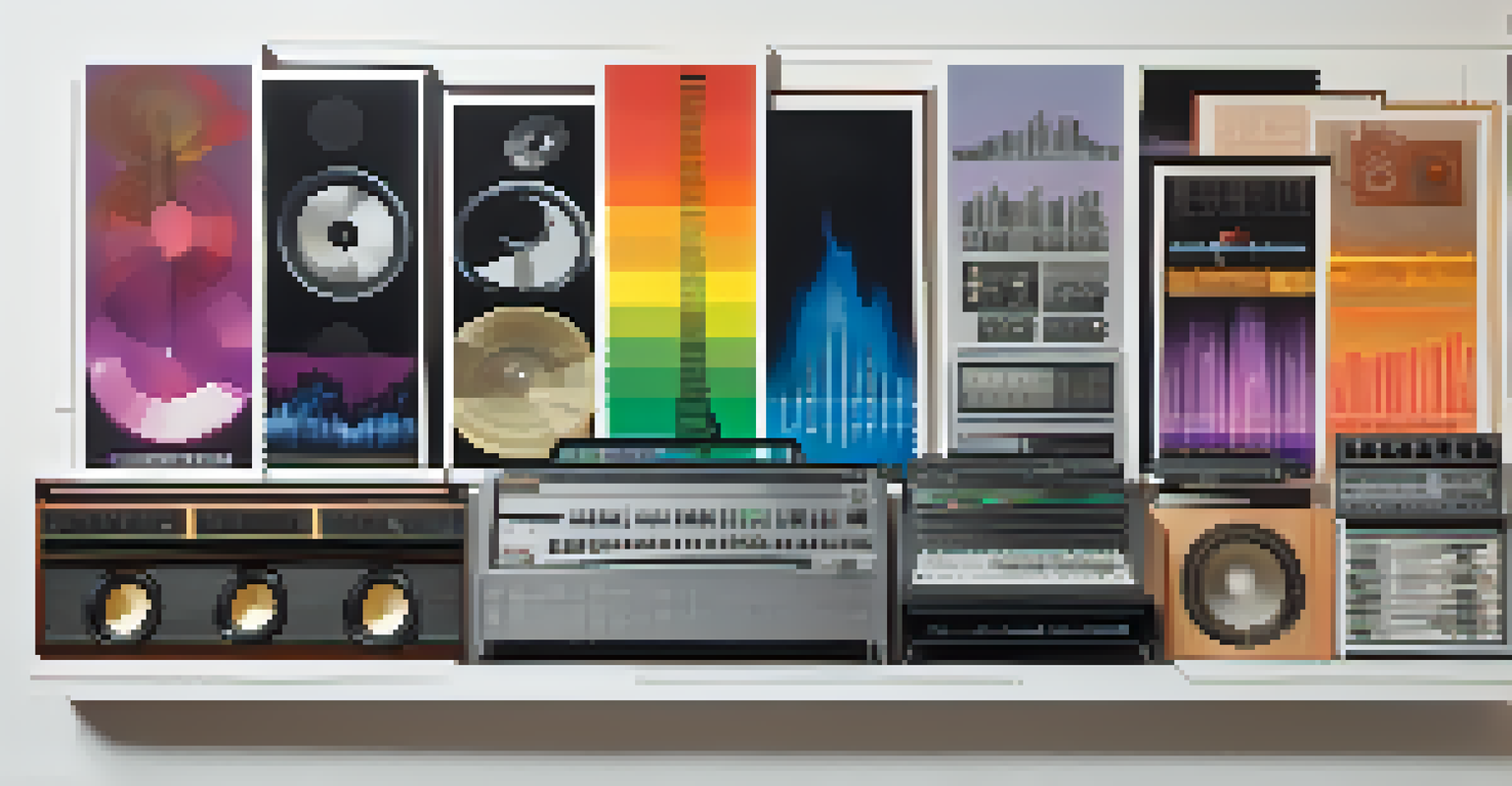The Role of Producer: Influences on Music Evolution

Understanding the Producer's Role in Music Creation
At the heart of every great recording is a music producer, a figure who orchestrates the creation of sound. Producers are responsible for overseeing the recording process, guiding artists, and making crucial decisions that shape a song's final output. They often wear many hats, acting as a coach, collaborator, and sometimes even a therapist for artists navigating their creative journeys.
Producers are the architects of sound, shaping the music that becomes the soundtrack of our lives.
Think of a producer as a film director, where the music is the movie and the artists are the actors. Just as a director shapes the narrative and aesthetic of a film, a producer molds the sonic elements of a track, determining everything from instrumentation to vocal arrangements. This multifaceted role is crucial, as the producer's vision can make or break a song's success.
In essence, a producer is the bridge between the artist's raw talent and the polished final product. Their expertise in sound engineering, arrangement, and genre-specific trends allows them to elevate a track to its highest potential. This unique position not only influences individual songs but also the broader landscape of music.
The Evolution of Music Genres Through Producers
Music genres have evolved dramatically over the decades, and producers have played a pivotal role in that transformation. From the birth of rock 'n' roll to the rise of hip-hop, savvy producers have experimented with sounds, blending genres and pushing boundaries. For instance, producers like Quincy Jones helped to redefine pop and R&B, creating timeless classics that still resonate today.

Producers often act as trendsetters, introducing innovative techniques or instruments that can change the direction of music. The emergence of electronic music in the late 20th century, spearheaded by producers like Daft Punk and Calvin Harris, demonstrates how creative production can shift entire genres. Their unique sounds have influenced countless artists, leading to new subgenres and styles.
Producers Shape Music's Sound
Producers play a crucial role in guiding artists and making key decisions that influence a song's final output.
As technology advances, producers continue to reshape the music landscape. The use of digital audio workstations (DAWs) and sampling has opened up endless possibilities for sound creation. This evolution not only influences the music itself but also how we consume it, with streaming platforms showcasing a diverse range of genres shaped by visionary producers.
Iconic Producers Who Changed the Music Game
Throughout music history, certain producers have become legends in their own right, leaving an indelible mark on the industry. Take Phil Spector, for example, whose 'Wall of Sound' production technique revolutionized pop music in the 1960s. His ability to create lush, layered arrangements set a new standard for production quality.
Music producers are the unsung heroes of the industry, often working behind the scenes to create the hits that define our culture.
Similarly, Rick Rubin is known for his eclectic approach, working across genres from hip-hop to heavy metal. His knack for stripping down songs to their essence while enhancing emotional impact has produced timeless records for artists like Johnny Cash and the Beastie Boys. Rubin's influence showcases how a producer's unique perspective can transcend genre boundaries.
These iconic figures not only shaped the sound of their respective eras but also inspired countless aspiring producers. By studying their methods and philosophies, new talent can find ways to innovate and contribute to the ongoing evolution of music production.
The Collaborative Nature of Music Production
Collaboration is at the heart of music production, with producers often working closely with artists to bring their visions to life. This partnership can lead to a magical synergy, where the strengths of both parties create something greater than the sum of its parts. Producers encourage artists to explore their creativity while providing guidance and expertise.
For instance, the collaboration between producer Timbaland and artist Missy Elliott has led to groundbreaking tracks that defined early 2000s hip-hop and R&B. Their ability to push each other creatively resulted in a unique sound that resonated with audiences worldwide. Such collaborations often result in iconic hits that stand the test of time.
Collaboration Fuels Creative Synergy
The collaborative nature of music production encourages a magical synergy between producers and artists, resulting in iconic hits.
However, the collaborative process can sometimes be challenging, as differing artistic visions may clash. A skilled producer must navigate these dynamics, finding a balance between maintaining the artist's voice and introducing innovative ideas. The best producers foster an environment of trust and creativity, allowing for unique artistic expressions.
The Impact of Technology on Music Production
In recent years, technology has dramatically transformed the music production landscape. The rise of digital tools and software has made it easier for producers to create, edit, and manipulate sound. This democratization of music production means that aspiring producers can access high-quality tools and resources without the need for expensive studio time.
For example, platforms like Ableton Live and Logic Pro have enabled producers to experiment with sounds and arrangements from the comfort of their homes. This shift has led to an explosion of new music, as independent artists and producers can easily share their work online. The accessibility of technology has also fostered a diverse array of genres and styles.
However, while technology provides exciting opportunities, it also presents challenges. With so much music being produced, standing out in a crowded market can be daunting. Producers must continually adapt to trends and find unique sounds that resonate with listeners, all while maintaining the authenticity of the music.
Producers as Cultural Influencers in Music
Producers do more than just shape sound; they also influence culture and societal trends through music. By collaborating with artists who reflect contemporary issues or movements, producers can amplify voices and messages that resonate with audiences. This cultural influence often leads to music that not only entertains but also inspires change.
For instance, producers like Pharrell Williams have used their platform to advocate for social issues, creating music that addresses topics like equality and environmentalism. Their ability to weave meaningful messages into catchy tunes makes an impact that extends beyond the music itself. This cultural relevance can help shape public perception and drive conversations.
Technology Transforms Music Production
Advancements in technology have democratized music production, allowing aspiring producers to create high-quality music from home.
In this way, producers become not just creators, but also cultural architects. Their influence on trends and movements demonstrates the power of music as a vehicle for change and expression. As producers continue to evolve, so too does their role in shaping the cultural landscape through the art of music.
The Future of Music Production and Its Potential
Looking ahead, the future of music production holds exciting potential as technology and creativity continue to intertwine. Innovations like artificial intelligence (AI) are starting to influence how music is created and produced, allowing for new forms of collaboration and experimentation. Producers may soon harness these technologies to push the boundaries of sound even further.
Moreover, as the music industry evolves, there will likely be a growing emphasis on sustainability and ethical practices in production. Producers can lead the charge by adopting eco-friendly methods and promoting awareness through their projects. This shift could not only change the way music is produced but also how it is consumed.

Ultimately, the role of the producer will continue to adapt, reflecting the changing landscape of music and society. As they navigate these changes, producers will remain essential in shaping the music of tomorrow, influencing both sound and culture for generations to come.